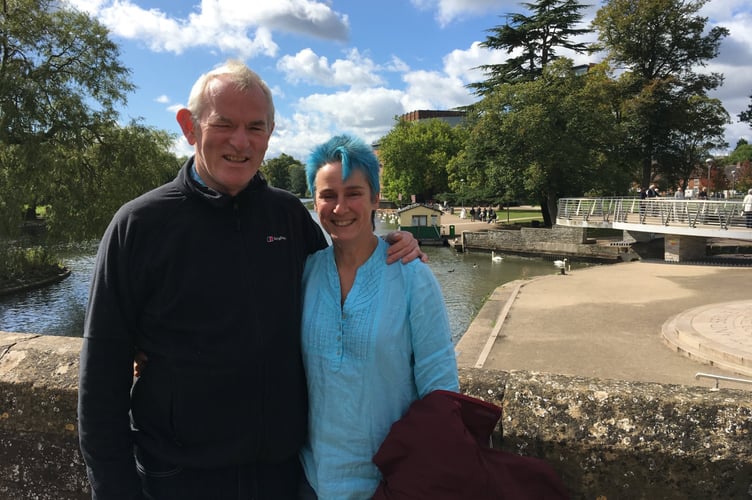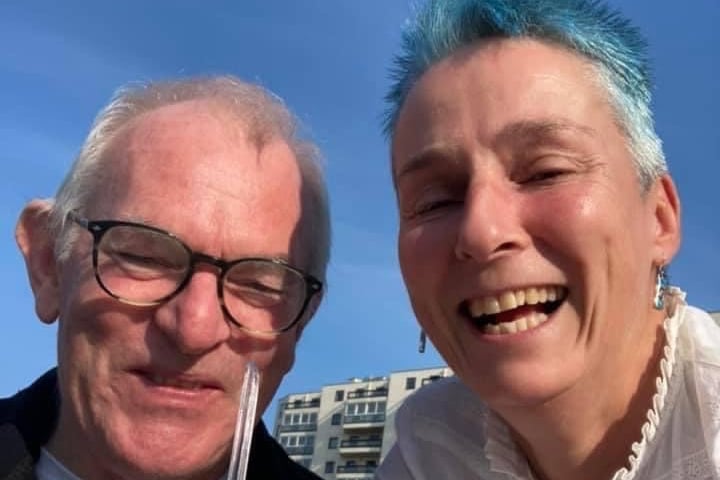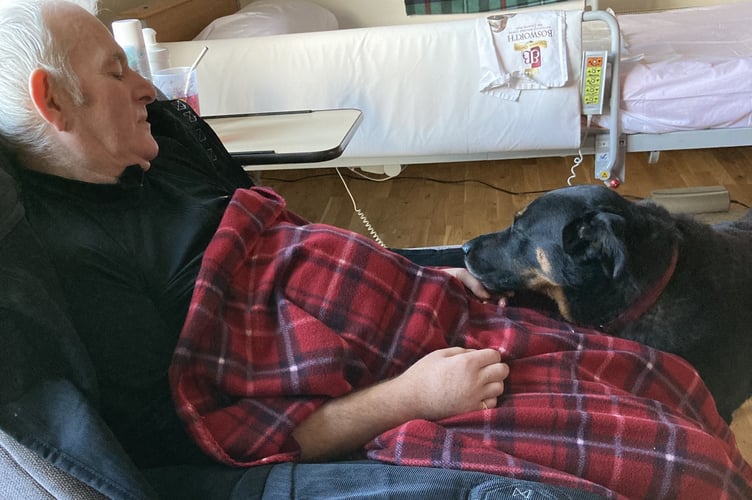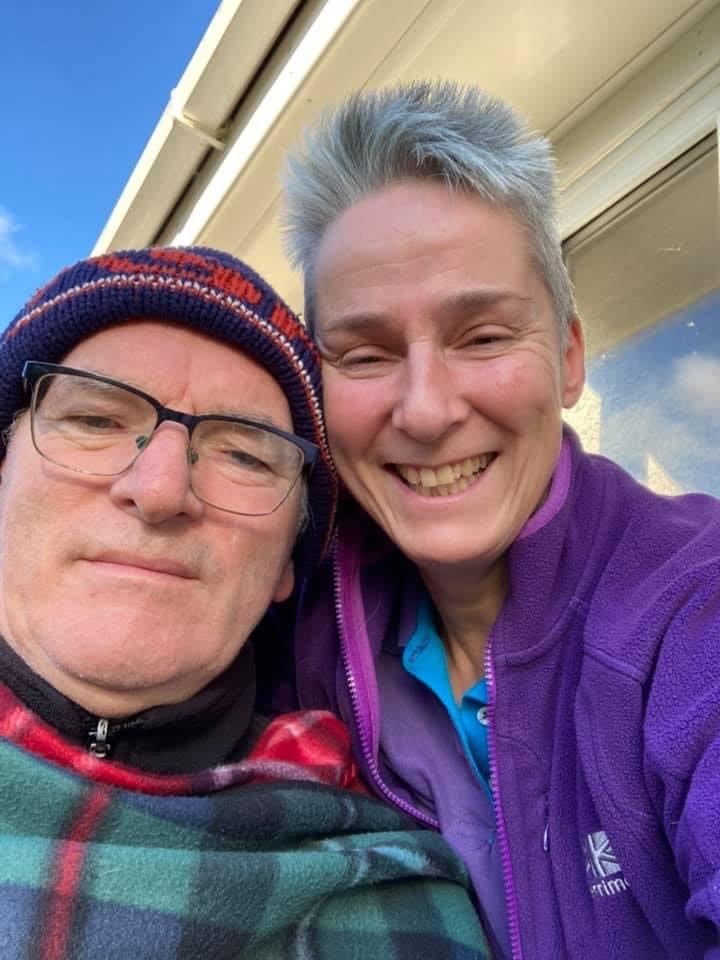The following story contains details that some readers may find upsetting
A widow who watched as a degenerative disease claimed the life of her husband has spoken out in support of the Isle of Man’s proposed Assisted Dying Law.
Sue Biggerstaff cared for her husband Simon Biggerstaff during the final months of his life as his health gradually deteriorated.
Simon, of Ballabeg, was diagnosed with the ‘most aggressive’ Motor Neurone Disease – a condition which progressively damages parts of the nervous system – in July 2021,
Two months after his diagnosis, the disease left the former operations manager at motorsport entertainment company Duke Marketing paralysed from the neck down.
‘From that point on he was stuck in a bed in the lounge,’ said Sue, who spent 17 years married to Simon.
‘His speech did deteriorate, it became incoherent, I could understand him until near the end and then nothing.
‘He would try and tell us something and would get very frustrated.
Sue remained by his side throughout Simon’s brave health battle, acting as his main carer.

Simon also received daily visits from hospice staff, district nurses, and care workers who would visit him for an hour, three times a day.
Around Christmas last year, Simon’s health took a severe turn for the worst due to unrelated stomach issues which often left him ‘screaming in agony,’ said Sue.
‘It was this constant rambling interspersed with crying out in pain all the time,’ she added.
‘He was losing it because he was in so much pain.
‘After that, he constantly said “I just want to go now”.
‘He then developed a bedsore from sitting up all the time, but he had to sit up otherwise he would choke.
‘This became a major issue that spread and they couldn’t do anything about it.
‘The horrible thing is, this bedsore that spread was literally his body rotting whilst he was still alive.
‘I have been told since that this happens to lots of people.
‘I said to the nurse “why can’t you do anything?”, and she said, “I’m sorry, Simon’s body is decomposing.”
‘To have somebody who is decaying on the outside, but is still going on the inside is horrendous.
‘Modern medicine can keep you alive, but it cannot when things are that bad, keep you pain free.

‘He’d say things like “I wish I could put my arms around you and make you feel better” but he couldn’t move anything.
‘The best we can do is I would put my head on his shoulder and try and press his head into mine.
‘Near the end, he didn’t ever want me to leave the room.’
Despite his wish to spend his remaining time at home, Simon was forced to live out the last 18 hours of his life in a hospice.
Sue said: ‘He had to go briefly into hospice as he had pain in his chest which was because he wasn’t exhaling carbon dioxide.
‘From then on he had to have this mask which he absolutely hated, it blew air into his mouth and he had to have that on all night and sometimes in the day as well.
‘He was terrified of it (the mask), obviously he couldn’t signal anything to me and he couldn’t speak if that was on either.
‘There was no dignity, just suffering.’
Sue revealed that Simon had hoped to stay alive long enough for one final Isle of Man TT.
‘His whole world revolved around it but he said in October “If I make it to the TT then starve me afterwards” because he wanted the pain to end.
Simon eventually passed away on May 27, 2022 at the age of 65 - the day before this year’s TT started.
The second reading of Alex Allinson’s Assisted Dying Bill is set to take place in the House of Keys next Tuesday (October 31).
The private member’s bill put forward in July last year, gives terminally ill adults, the right to, at their request with specified assistance, end their own life.
Polling conducted in September by Island Global Research on behalf of Dignity in Dying, a campaign group for assisted dying, canvassed the views of 1,206 residents from across the Isle of Man.

From the poll, 66% of respondents supported the introduction of assisted dying as an option for terminally ill, mentally competent adults,
But in a consultation on the matter led by the government earlier this year 49.61% of respondents said that they disagree that assisted dying should be permitted for terminally ill adults in the island, with 49.01% of respondents saying that they agree that it should be permitted.
That consultation received 3,326 responses.
The Assisted Dying Bill 2023 states that individuals must be an island resident diagnosed with a terminal illness and with a life expectancy of six months or less to be eligible.
Under these terms, Simon would have been able to end his life legally if the Assisted Dying Bill was made law.
After her own tragic experience caring for her late husband, Sue thinks that island residents should be allowed the freedom to choose to end their ‘suffering’.
‘I know he would have chosen assisted dying,’ said Sue.
‘He should have been able to have that choice, as it was, he chose to starve, and according to the doctor that takes 30 days, it would have been 30 days more of suffering.
She added: ‘Unless you actually witness it, you cannot imagine how horrible it is to watch somebody for the last few weeks of their life and certainly the last few days, where all they can think about is the pain, there isn’t anything else just pain and you can’t do anything about it.
‘Nobody should have to go through what Simon went through.’


.png?width=209&height=140&crop=209:145,smart&quality=75)
-(1).jpeg?width=209&height=140&crop=209:145,smart&quality=75)
-(1).jpeg?width=209&height=140&crop=209:145,smart&quality=75)
Comments
This article has no comments yet. Be the first to leave a comment.